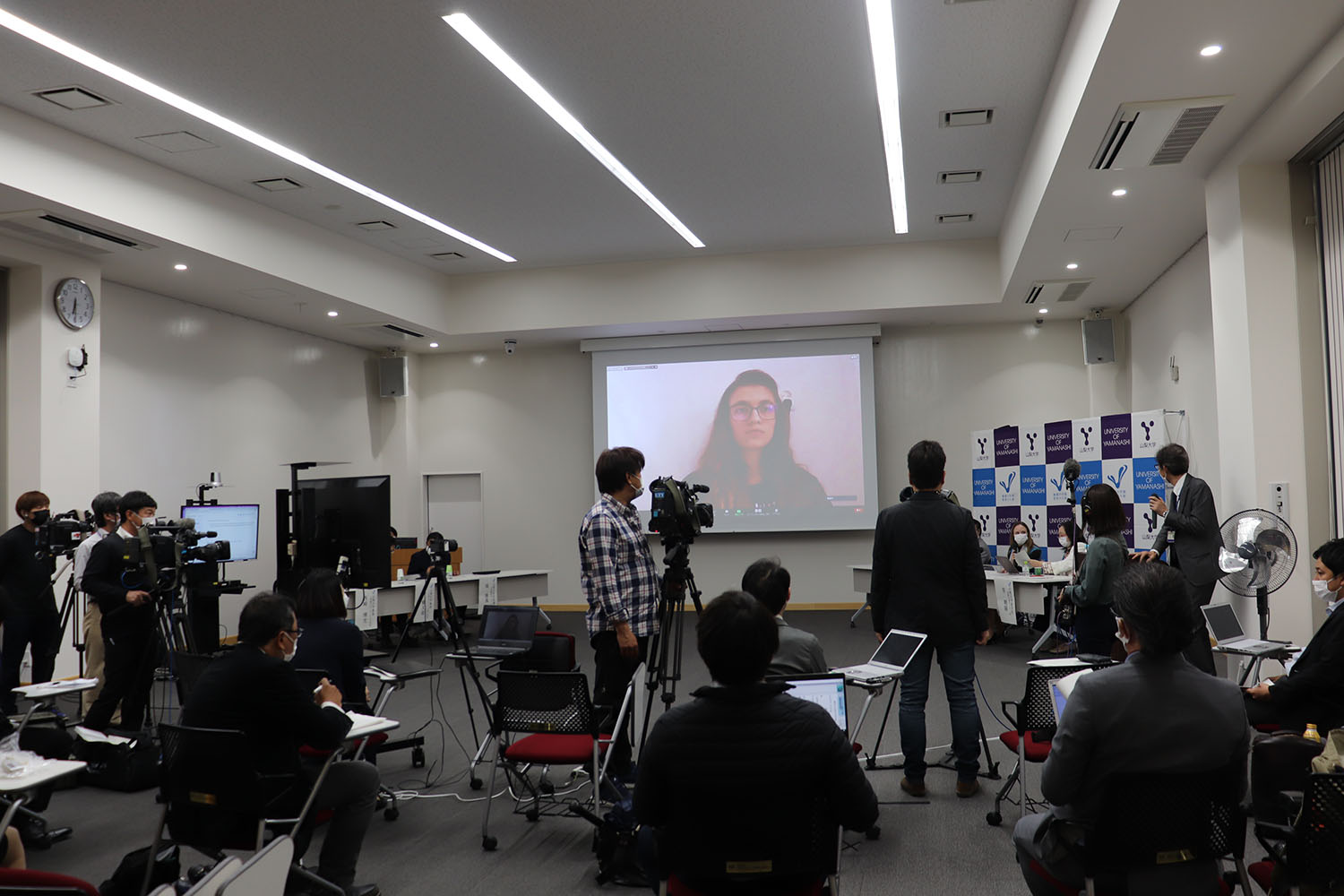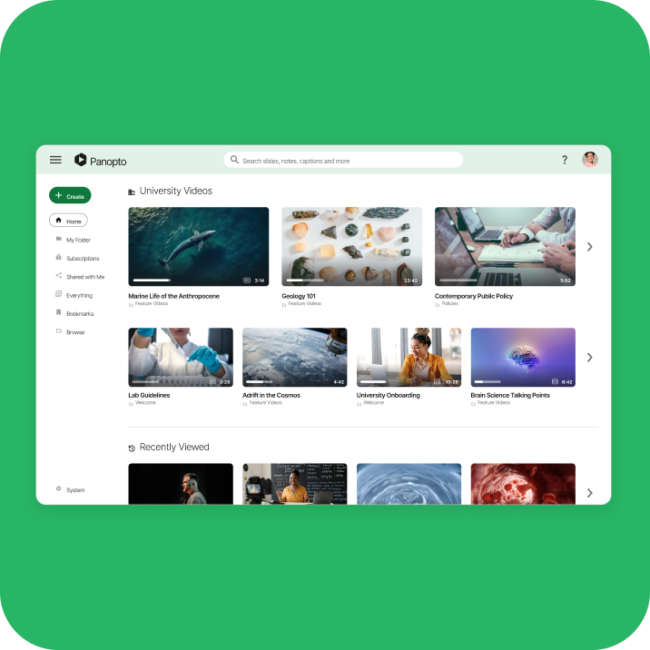- Distance Learning
The University of Yamanashi: Providing Virtual Classes to Ukrainian Students with Panopto

While Russian forces continue to cause insurmountable damage to educational facilities in Ukraine that have left thousands of students displaced, the University of Yamanashi, located in both Kofu and Chūō, Japan, is responding by offering a safe way for students to continue their academic studies – online.
As of May 11, 2022, over 1,600 educational facilities across the country have been damaged, with 126 destroyed due to bombing and shelling, according to Ukraine’s Ministry of Education and Science.
Supporting Ukrainian students in need
At the beginning of April 2022, the University of Yamanashi began sharing lectures online to eligible graduates from universities in Ukraine’s second-largest city, Kharkiv. The initiative began in early March 2022 after Fomichova Ksenya, a Ukrainian employee at the University of Yamanashi, connected professor Xiaoyang Mao, the university’s vice president and director of the Center for International Exchange, with professor Sergii Markovich, the deputy-director for international relations of Kharkiv Aviation Institute to initiate the collaborative program. The president of the University of Yamanashi, Shinji Shimada, pushed professor Mao to implement the initiative immediately.
Ksenya also received a request from the vice president of the Kharkiv Aviation Institute saying, “Please give me a class,” according to Asahi Shinbun Digital. The institute had undergone significant damage following the Russian attacks. “I didn’t think there was a desire to teach in a terrifying state,” Ksenya says. Eligible Ukrainian students filled out a Google form online with their details which professor Markovich collected and sent out to the University of Yamanashi for processing.
During a frightening time for the people of Ukraine, the initiative is vital in helping students stay focused and involved in their studies.
“I believe that education is not only giving knowledge, so meeting students and teachers mutually in person is very important. But with the current situation in Ukraine, the asynchronous on-demand learning has given students the enormous opportunity to continue [their] higher study, even in the war,” Masanori Hanawa, an advisor to the president, the director of Center for Higher Education, and Professor, Department of Electrical and Electronic Engineering, Faculty of Engineering at the University of Yamanashi, told Panopto over Zoom.
Students are able to choose from 13 specially prepared courses online, including seven courses for computer science, three for environmental issues, and three for clean energy technologies. “But all Ukrainian students wanted to join courses for computer science only,” Hanawa says. The classes in the support program are officially recognized by Ukrainian universities so students who finish the courses at the University of Yamanashi will receive credits from their own universities.
As a Panopto system administrator, Hanawa maintains direct contact with some of the Ukrainian students and has received multiple emails thanking him and the school for the program. “I am very happy and honored to work for this outstanding project,” he says.
Asynchronous learning increases accessibility for Ukrainian students
Initially 36 students from Ukraine signed up for the classes. To date, 560 students from five different universities have registered, including Kharkiv Aviation Institute, Kharkiv National University of Radio Electronics, Simon Kuznets National University of Economics, Ukrainian State University of Railway Transport, and Zaporizhzhia Polytechnic National University. Students who have evacuated Ukraine are also able to take classes if they have access to the internet.
“I have not confirmed [the] locations of Ukrainian students recently but when I checked it many of them were outside Ukraine. I guess that it is because of the emergency evacuation. But even as the students spread in the world, online courses give them a light of hope [in] keeping their higher study,” Hanawa says.
Ukrainian student Aryona Veprizika graduated from the Kharkiv Aviation Institute and escaped from the city with her mother. She is now taking online classes at the University of Yamanashi from Poland.
“There is a lot of trouble, but we are studying. I want to do it, and it’s a very important opportunity to start this project. I’m really grateful for making hope,” Veprizika said during an online press conference on April 8, according to NHK.
COVID-19 altered the education landscape
When COVID-19 hit in 2020 the nature of education changed worldwide, with the University of Yamanashi being no exception. Courses taught on the university’s learning management system Moodle skyrocketed from 10% to 90%, seeing a substantial transition to online teaching, which led the university to expand its search for supporting integrations that would assist with video management.
Panasonic Connect introduced the university to Panopto in 2021, providing a suitable commercial video solution for the first Japanese inter-university collaboration between a national university and a prefectural university. It was initially set up to teach the university’s Japanese students as it connected seamlessly with Moodle. “Every course in the university now has a Panopto folder…And then the war in Ukraine started and the university decided to support Ukrainian students,” Hanawa says.
“Just by registering on Moodle, students can also use Panopto. This is a very strong power I think,” Hanawa says. The success of the integration saw the use of Panopto skyrocket at the university, which paved the way for the crucial initiative helping Ukrainian students.
The University of Yamanashi is currently using Panopto to offer on-demand pre-recorded lectures in English. After receiving personalized requests from Ukrainian students, Hanawa is also working on translating some of the lectures into Ukrainian with added subtitles. To further support students’ learning, every week students have synchronous chatting time, as well as 90-minute, real-time discussion with lecturers once every two to three weeks.
When it comes to the asynchronous versus synchronous learning discussion, Hanawa believes that both are important. “Not only giving lectures in person or online, but also interactions between students/teachers or students are mandatory for higher education. Therefore, the future of education should be a good combination of async and sync.”
Online learning providing relief in the midst of a war
The access to online classes and video learning is providing significant relief to a country in extreme distress. According to the May 2022 United Nations Security Council, in mid-March over 15,000 schools resumed education in Ukraine, primarily through remote learning or in-person hybrid options.
Looking to the future, professor Hanawa believes online video management systems like Panopto will continue to be essential during times of crisis. “I hope Panopto will be used widely to support such people in very tough situations. Not only in Ukraine but all over the world…I think Panopto has the power to support them.”
The University of Yamanashi joins a number of international higher education institutions like the University of Miami that are using online learning resources to offer support to Ukrainian students whose studies have been impacted by the war.
Because of Ukraine’s university timetable, the classes are scheduled to finish at the end of June, but Hanawa is looking forward to being a part of more benevolent learning partnerships. “We want to have more collaboration, not only with Ukrainian [students] but also all over the world. …These kinds of worldwide collaborations should proceed more and more.”


